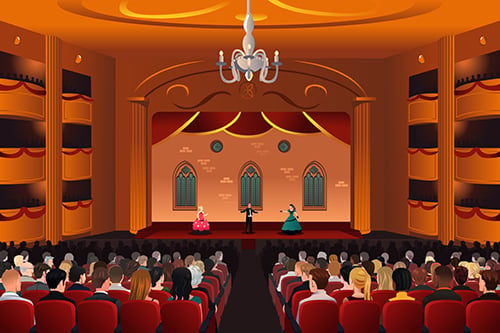How to Be a Good Audience: Top 10 Rules for Audience Etiquette
Teach students how to be a good audience with these top 10 rules for live theater etiquette. Perfect for classroom prep or pre-show discussions—includes tips on tech use, applause, and attention.
Katie Zakkak
8/8/20253 min read


🎭 Drama teachers, feel free to share this directly with your classes!
Looking to extend the lesson? You can check out my lesson plan, full set of slides and printable handout on TPT here.
Attending a live theater performance is a truly unique experience. Unlike movies or videos, live performances involve a special relationship between the audience and the performers. The actors are feeding off your energy and focus—and that means your behavior as an audience member directly impacts the quality of the performance. Whether you're a student attending your first play or a teacher preparing your class, these ten rules will help everyone have the best possible experience.
Arrive On Time
Arriving late can be a major disruption—not only to other audience members, but also to the performers who may be thrown off by movement and noise. Plan to get there early enough to pick up tickets, find your seat, and get settled.
Latecomers may be held in the lobby until an appropriate break.
Arriving early helps you find your seat calmly and respectfully.
Being on time shows respect for the performers’ preparation.
Turn Off All Devices
Before the lights go down, make sure every phone, smartwatch, or device is silenced or turned completely off. The light from a screen can distract other audience members, and in some venues, phone signals can interfere with sound systems.
Even screen glow is distracting in a dark theater.
Airplane mode is often preferred to full silence.
Respect the tech rules announced at the beginning of the performance.
No Talking
One of the fastest ways to break the atmosphere of a live performance is by talking during the show. Even whispering can be heard in a quiet space and disrupt the experience for those around you.
Save comments for intermission or after the show.
Focus on listening and being present in the moment.
Show performers the courtesy of your full attention.
No Photos or Recording
Taking pictures or videos is not just distracting—it’s often illegal. Flash photography, in particular, can be harmful or dangerous to performers. Always follow the venue’s specific guidelines.
Flash can momentarily blind or startle actors.
Recording may violate copyright rules.
Enjoy the show live—leave the documentation to the professionals.
React Respectfully
Theater invites a wide range of emotions, and it's okay to react—just know when it's appropriate. Laughter, gasps, or applause should happen naturally, not excessively.
Clap after songs or scenes when others do.
Avoid yelling or loud outbursts.
Save big reactions for curtain call unless prompted otherwise.
Respect the Space
The theater is a shared space, and everyone should treat it with care. Whether it’s a school cafetorium or a professional stage, keeping the space clean and undamaged is everyone’s job.
Keep your feet off other seats.
Don’t kick or shake the chair in front of you.
Pick up any trash around your seat, even if it isn’t yours.
No Eating or Drinking
Unless specifically allowed, snacks and drinks are usually prohibited in performance spaces. The crinkling of a wrapper or slurping of a drink can ruin a dramatic moment.
Leave snacks at home or enjoy them before the show.
Water is usually acceptable, but check venue rules.
Avoid rustling bags or noisy containers.
Be Present
Live performance is meant to be an immersive experience. Give your full attention to what's happening on stage—this isn't a time for multitasking.
Don’t check your phone, even briefly.
Stay focused on the performers and the story.
Engage with curiosity and respect.
Don’t Distract the Performers
Yes, they can see you. Performers are trained to focus, but movement, noise, or unexpected actions from the audience can still break their concentration.
Avoid waving or signaling to people on stage.
Don’t try to interact unless the show encourages it.
Stay still and silent during intense or emotional moments.
Show Appreciation
At the end of the performance, show your appreciation with applause. It’s the best way to say thank you to the cast and crew for their hard work and dedication.
Applaud at curtain call and during key moments if appropriate.
Follow the lead of more experienced audience members.
Clapping is your way of participating in the shared experience.
Final Thoughts
Enjoy the show! The performers have worked hard to bring joy to their audience. No two live performances will ever be exactly the same, so you have a unique opportunity every time you see a live event. Appreciate your time and allow the experience to entertain and enliven you.
Teachers—Want More?
If you’d like a ready-to-go classroom version of this post, check out my Audience Etiquette slides and handout on TPT. You can also download my Free Drama Teacher Toolkit, which includes helpful warm-ups, classroom prep checklists, and more. Plus, when you sign up, you’ll get weekly updates with tips for drama teachers.
Happy teaching, and break a leg!
